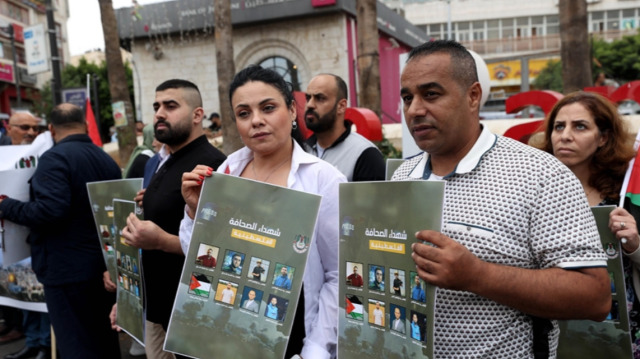
At least 8 journalists killed, 2 missing in Israeli airstrikes on Gaza, according to Palestinian enclave’s press office
International press bodies have expressed their concerns over the killing of journalists in the ongoing conflict between Israel and Palestine, calling for an immediate investigation into deaths.
Committee to Protect Journalists (CPJ) has stressed that journalists are civilians doing important work during times of crisis and "must not be targeted by warring parties."
"Millions across the world are counting on reporters in the region to provide accurate information about the conflict. Journalists, like all civilians, must be respected and protected," Sherif Mansour, CPJ’s Middle East and North Africa program coordinator, said in a statement on Tuesday.
The CPJ, which is documenting the number of journalists killed, injured, detained or missing in the conflict, said that at least seven journalists were killed, two were missing and two others injured in the first three days of the conflict.
Meanwhile, the International Federation of Journalists (IFJ) as well as the Palestinian Journalists Syndicate (PJS) have condemned the killings and attacks on journalists.
The IFJ has called for an "immediate investigation" into their deaths.
In a statement on early Wednesday, the Palestinian enclave's press office said that at least eight journalists were killed and two others went missing in Israeli airstrikes on Gaza.
The office said the slain journalists included Said al-Taweel, Mohammed Sobboh, Hisham Nawajhah, Ibrahim Lafi, Mohammad Jarghoun, Mohammad Al-Salhi, Esad Shemlah, and Selame Mime.
Two other journalists, Nidal Al-Wahidi and Haitham Abdelwahid, were missing, it added.
Meanwhile, the houses of three journalists were completely destroyed and at least 40 media outlets were said to be the target of airstrikes.
In a dramatic escalation of Mideast tensions, Israeli forces have launched a sustained and forceful military campaign against the Gaza Strip, a response to a military offensive by the Palestinian group Hamas in Israeli territories.
The conflict began when Hamas initiated Operation Al-Aqsa Flood against Israel, a multi-pronged surprise attack including a barrage of rocket launches and infiltrations into Israel via land, sea, and air, which Hamas said was in retaliation for the storming of the Al-Aqsa Mosque in occupied East Jerusalem and Israeli settlers’ growing violence against Palestinians.
In response to Hamas' actions, the Israeli military launched Operation Swords of Iron against Hamas targets within the Gaza Strip. Israel's response has extended into cutting water and electricity supplies to Gaza, further worsening the living conditions in an area that has reeled under a crippling siege since 2007.

